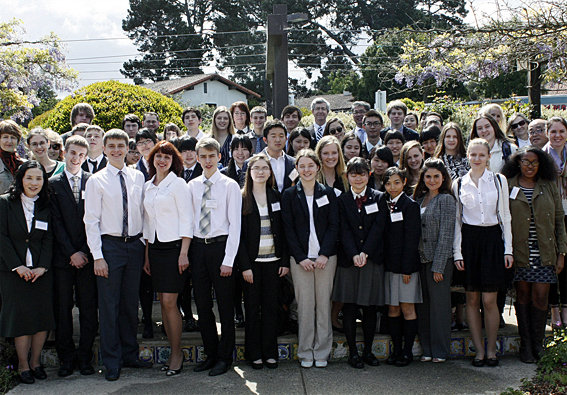Masako Toki
April 18, 2014
2014 Critical Issues Forum

Students and teachers from Japan and Russia joined their peers from the US at the 2014 spring conference of the Critical Issues Forum – an outreach project in disarmament and nonproliferation education for high school students – convened by the James Martin Center for Nonproliferation Studies on April 4th and 5th at Santa Catalina School in Monterey.
CIF 2014 photo galleries
Conference presentations
CIF website
At the Critical Issues Forum (CIF) conference, students arrive from five US high schools: (California, Connecticut, Maine, Massachusetts, and Wisconsin), four Russian high schools in closed nuclear cities (Lesnoy, Novouralsk, Ozersk and Zelenogorsk), and six Japanese schools from Hiroshima, Nagasaki, Kanagawa and Tokyo presented their findings on the topic “Nuclear Nonproliferation: Global Opportunities and Regional Challenges.” The CIF program is managed by the James Martin Center for Nonproliferation Studies at the Monterey Institute.
Every year, the CIF project provides opportunities for high school students to address one of the world’s most pressing problems. This year, the CIF project has challenged participants to study the relationship between regional security and international nuclear nonproliferation and disarmament issues. Students identified nuclear nonproliferation and disarmament challenges, evaluated what progress has been made, and envisaged what must be done to make further progress in both areas.
The spring conference is the culmination of the semester-long CIF project that begins with a teacher training workshop. This academic year’s teacher workshop was held in December 2013 using an online conference tool. For the spring conference, all the CIF students completed mini-project 1 and prepared for the spring conference presentations under the guidance of CIF teachers.
Last year, CIF started engaging Japanese students in Hiroshima and Nagasaki, the two cities devastated by atomic bombs in August 1945. This year, Japanese participation expanded to Tokyo and Kanagawa, in the eastern part of Japan. Professor Nobumasa Akiyama of Hitotsubashi University, who is one of the leading experts in the field of nonproliferation and disarmament in Japan, joined the CIF conference as a chair of the CIF-Japan steering committee. In addition, one of the high school students from Hiroshima has been appointed as a “Youth Special Communicator for a World without Nuclear Weapons” as part of a project launched by the Japanese government last year to convey the importance of nuclear disarmament to the world.
Student Presentations
All participating students presented and exchanged their findings on their chosen topic in a creative and innovative way, followed by an open discussion centered on a question and answer session with their peers and teachers.
Many schools focused on nonproliferation challenges in the Middle East, such as Iran’s nuclear problem, tensions between Israel and Arab nations surrounding nuclear issues, and a Middle East Zone free of weapons of mass destruction. Some schools examined the nuclear weapons rivalries between India and Pakistan in South Asia. Two of the Japanese schools investigated the volatile security situation in Northeast Asia that has been exacerbated by North Korea’s nuclear and missile tests, and the recent uneasy relationship between Japan and its neighboring countries. In addition to these regional foci, some schools presented US-Russia arms control agreements and the future prospects of bilateral negotiation toward a world free of nuclear weapons.
The CIF project is designed to develop critical thinking skills and to engage students and teachers around issues related to international peace and security. Students were also engaged in interactive and cross-cultural activities during the conference and had the chance to interact with graduate students studying nuclear disarmament issues in the Monterey Institute’s Nonproliferation and Terrorism Studies program.
The CIF conference also welcomed Norwegian Consul General in San Francisco Hilde Janne Skorpen as a keynote speaker. She spoke about the Humanitarian Impact of the Use of Nuclear Weapons. This issue has been drawing increasingly attention recently, and many CIF students also mentioned this issue in their presentations. Norway is one of the leading countries in this field and hosted the first conference on humanitarian impact of nuclear weapons in Oslo, in March 2013. As a closing keynote address, Professor Nobumasa Akiyama encouraged all the students to be innovative and creative in thinking about a world free of nuclear weapons.
The CIF project team sincerely hopes that these young leaders for the next generation will be the driving force to accomplish the goals of a world without nuclear weapons. We believe that the CIF project exemplified how education can promote nuclear nonproliferation and disarmament.
This year’s CIF program is funded by the United States-Japan Foundation, a New York–based organization supporting activities to deepen friendship and understanding between Americans and Japanese, and the Tokyo Club, Japan’s oldest and most prestigious gentlemen’s club. The CIF program also receives support from the Chapman Foundation for students in Monterey. Find more information about the CIF program and view this short video.
View presentations.
